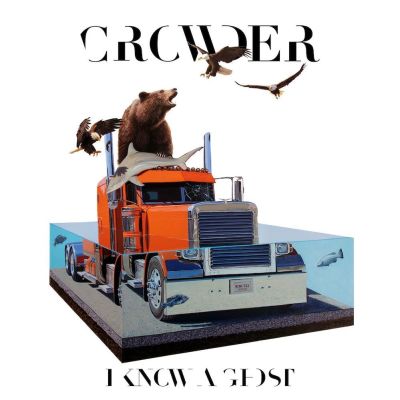Crowder reveals why he describes God’s presence as ‘Ghost’ instead of Holy Spirit

Three time Grammy-nominated artist David Crowder, who's synonymously known as Crowder, released his new album I Know a Ghost last month and says he decided to use the word ghost instead of spirit as a way to draw more people.
After its release in November, I Know A Ghost debuted in the Top 5 on Billboard’s Christian Albums chart. As he has in the past, the multi-instrumentalist offers a diverse catalog of music on this new record with a modern blend of bluegrass, country, electronic-synth, gospel and Southern hip-hop.

Below is an edited transcript of The Christian Post's interview with Crowder where he explains his reasoning behind the album title, his song selections, and how Christians should view Creation in the midst of the world's chaos.
The Christian Post: I Know a Ghost is such a clever title. What made you go with that as the title of the record?
Crowder: Well, I started thinking about the Gospel in a way [that] had never dawned on me before. So Jesus is with His pals, the disciples, at this meal they’re having together, the last supper, and He says, “Hey, I don’t think you’re getting it, but I'm going away, like, for real, I really am going to go away, like, super soon. But don’t worry, don’t worry. I’m gonna leave something with you. I’m gonna leave you My ghost. And it’s gonna be a comfort to you.”
Lots of us are used to hearing this story, but that’s some weird spooky stuff when you think about it. Amazing though. We've got the Holy Ghost. I know a ghost. That is a startling reality to become aware of and a new way of looking at a story I've been familiar with since childhood.
CP: What made you go with ghost and not spirit?
Crowder: It's a word that doesn’t have the same type of baggage attached to it outside of church culture. There's a fascination that's less threatening. There’s something about the word “ghost" that makes your everyday person feel more comfortable than “spirit,” because there's less church language attached to it.
If I were sitting on a plane and had a conversation with the person sitting next to me and they asked "What do you do?" And I said, I write church music, like Holy Ghost church music, you know, foot-stomping, hand-clapping kind of stuff. That feels accessible to most folks as opposed to talking about “worship music” and “the holy spirit,” which some people have less of a connection with and are less comfortable talking further.
There's a resonance in every culture throughout all of history, we as humans have always told one another ghost stories. And here, the whole time, I’ve been sitting on a ghost story. I’m a part of a ghost story. I believe I’m in the constant presence and activity of the Ghost of God. If that doesn’t make someone curious and want to know more, well, I have other things I can discuss as well — hope, redemption, grace, love, forgiveness, compassion, justice.
I just think anytime you see us as humans continually scratching at something there's usually a foundational truth there in it somewhere. I can’t list all of the haunted and ghost oriented television shows that play constantly on the History or Discovery Channel. The list of movies is endless. There is something innate in us that is searching for the beyond.
CP: You have been amazing at bridging cultural divides with your music. Tell us your heart behind that, especially in this climate of such division? How could other Christians do a better job of this?
Crowder: This album, in even just the music, attempts to express my view of a reality that what we have in common, as humans, it’s so much more beautiful and vast than what divides us.
Most of it is determination to shift our perceptions and realigning our awareness of what is real. We have to recolonize our imaginations and it's so difficult to do so, which is why I think Jesus' command to love our neighbor as ourselves is so revolutionary. You can choose to see the train tracks that cut through a town and divide neighbor from neighbor — this side of the tracks and that side of the tracks. Or you can see them as a thing that stretched from one ocean to another and brought people together, as a thing that brought stuff that was far away into proximity to one another.
In the lyrical content, there's a firm and redundantly stated belief that no one is so far gone that redemption cannot reach. There is a rejection of nihilistic relativism. We are connected to one another and joined together by the breath of God that breathed into the dust that we all came from and that we all will return to.
We came from God and we are going back to God, and it is His breath, His Spirit that's in us that causes us to vibrate in wonder when we recognize the beauty of His Creation and the relentlessness of His redemptive pursuit.
CP: Which song on the album is nearest to your heart at the moment, please explain?
Crowder: The answer to this question changes day to day for me because I need to be reminded of different things at different times, but ”Red Letters" is the song that we decided to get to folks ears first and I love it.
I remember sitting on the pew at First Baptist Church in Texarkana, Texas, next to my grandmother, Lucile, as a kid. She had the biggest Bible ever made, I’m certain, and I was sitting next to her while Dr. Lowry was preaching and I asked her, “Why are some of the letters written in red?”
She had a Red Letter Edition and all the words that were spoken by Jesus or were scriptures foretelling His coming, or scriptures He had quoted, were written in red typeset. She said, “David, anytime Jesus is talking, you need to pay attention.” Those are good words that I still ring inside of me. There’s this meta-narrative throughout Scripture that is a scarlet thread woven through all of history — through Hebrew scriptures into the New Testament. When you see this, you realize, it’s Jesus! He is there and the grace of God is there the whole dang time.
This guy named Louis Klopsch came up with the idea for the red letter Bible, which was brilliant. I love this, this is what he says in the forward: "It sheds a new radiance upon the sacred pages, by which the reader is enabled to trace unerringly the scarlet thread of prophecy from Genesis to Malachi. Like the Star which led the Magi to Bethlehem, this light, shining through the entire Word, leads straight to the person of the Divine Messiah, as the fulfillment of the promise of all the ages." That right there is worth singing about.
CP: It seems like every month we wake up to news of another mass shooting or some type of tragedy. As a public figure and minister of music, how do you not get desensitized to the world we live in today? What can we do besides pray?
Crowder: As mentioned, we have to decolonize our imaginations. Most of what we consume throughout the day is not a vision of ourselves and the rest of Creation that is aligned with the intentions and dreams of God for us.
Our imaginations are colonized by untruths that we feel are true because we are told them often enough by so many sources that we buy in. It takes intention to realign ourselves to the awareness of what is real. Our imaginations are not stimulated to see these acts unfolding in the very presence of God. Our minds aren’t inundated with images and input that reinforce the reality that the activity of God is afoot in the places and moments that seem unlikely to us. The veil was torn from top down and suddenly, He is everywhere. Every space is sacred. Every moment holy.
Daniel is my favorite character in scripture. He is a captive, he is displaced, the new land doesn’t share his understanding of the fullness of life intended by our maker. He is educated in the new land with the specific intent to separate him from his Jewish culture and reform them in Chaldean ways. And Daniel excels in areas antithetical to his previous culture, in general learning and science from the wise such as astrologers, and what happens? He gets the ear of the King.
This lets me know that it's possible to be inundated by information and yet still hold to the real. To do so, Daniel made choices that were demanding. We have to do the same with equal determination and belief in truth.
CP: Albums rarely have more than 11 songs in this day an age, I love all of your choices on the album, what made you include them all?
Crowder: Well, I could hardly stop myself at 16 songs. I had so much fun writing for this record and it was a completely different approach to the way I’ve written music in the past.
Living in Atlanta for several years now, I’ve been right up next to that southern hip-hop scene. I love so much of what is happening musically right now with so much cross-pollination. Specifically, I love the tonalities and sounds that are in the tracks of shoe-gazing hip-hop, it’s so cinematic and spacious at the same time.
I wanted to know how this stuff was being made and I wanted to know how Drake spits out 80 songs in a year and you know there’s probably another mixtape about to drop again at any moment. The deal is there are tons of folks out there making tracks and so a rapper can just walk into a studio and start listening down to a bunch of tracks until something starts to hit them, and before you know it they’re in the vocal booth spitting a song out. I wanted that.
So I hit up a bunch of track guys and they would send me dropbox files with like 12 tracks in them that were like a vibe for what might be a verse and a chorus, just music, but it would have scene to it, a feel, a mood, and if one of them hit me I would start writing into it. I would then work with writers and producer friends of mine to refine and add to or take away from the original track stems.
It was the most fun I’ve had writing music. I love how it blurs the lines, all these different sounds and different people working together that blend in a way that feels really diverse and yet somehow cohesive. I couldn’t be happier with how it turned out.
I Know A Ghost is now available everywhere, for more information, visit crowdermusic.com.




























